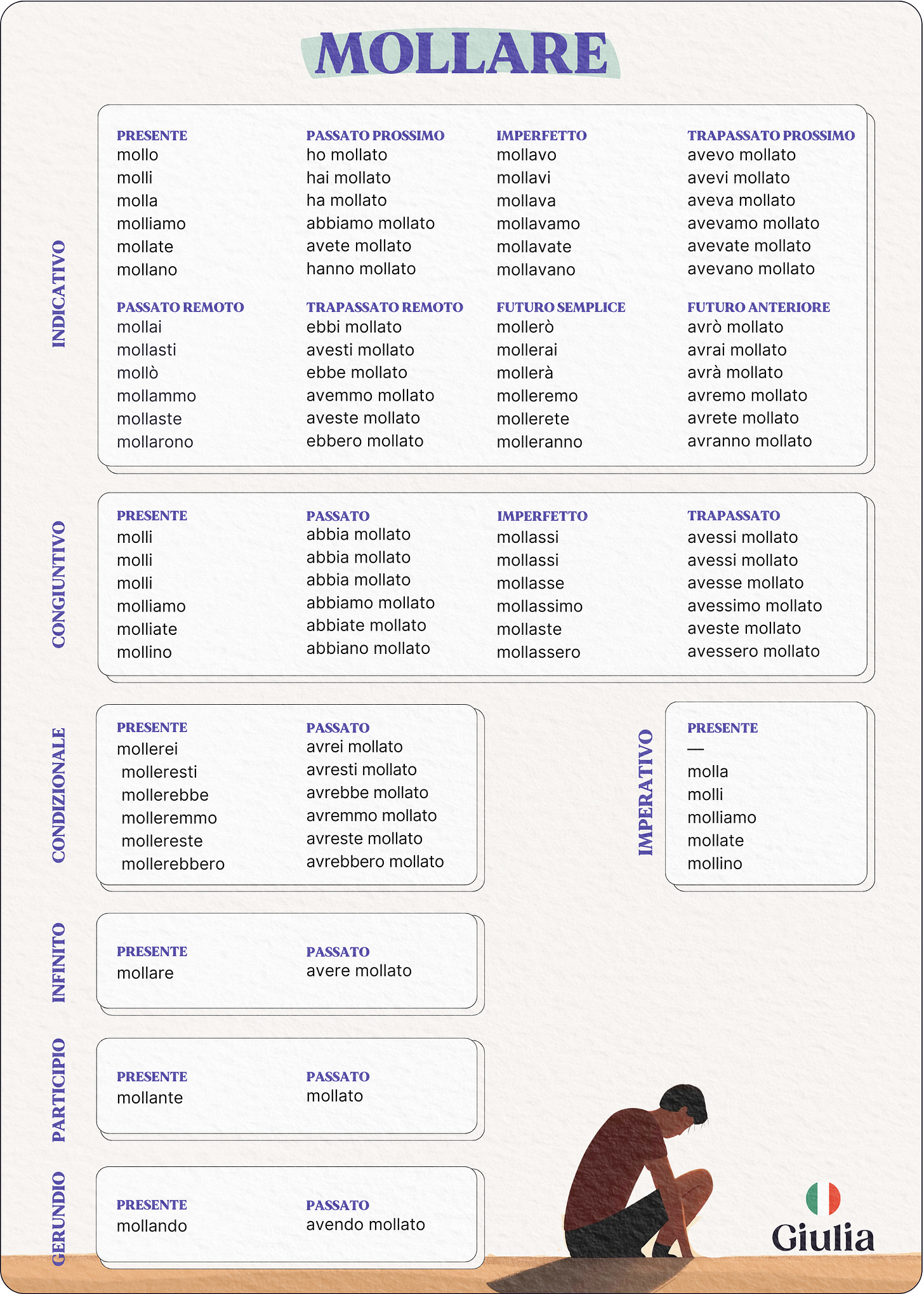Mollare (transl. To Let Go, To Give Up)
Verbo utile per sfide difficili, amori finiti e... cattivi odori.
🎙️ COME SI PRONUNCIA?
[mol-LAH-reh]
VERBO TRANSITIVO, INTRANSITIVO E RIFLESSIVO
TRANSITIVE, INTRANSITIVE, AND REFLEXIVE VERB
To let go, to release.
🇮🇹 Lasciar andare, allentare un cavo, una fune o una presa.
🇬🇧 To release, to loosen a cable, rope, or grip.
To give up, to quit.
🇮🇹 Desistere, rinunciare a un'impresa o a un proposito.
🇬🇧 To give up, to abandon an endeavor or purpose.
📋 COME SI CONIUGA?
🇮🇹 Mollare è un verbo regolare della prima coniugazione (-ARE).
Nei tempi composti può utilizzare sia l'ausiliare avere (forma transitiva e intransitiva) che essere (forma riflessiva: mollarsi).
🇬🇧 Mollare is a regular verb of the first conjugation (-ARE).
Compound tenses can use the auxiliary verbs avere (transitive and intransitive form) and essere (reflexive form: mollarsi).
💬 ESEMPI
Il sub mollò la zavorra per risalire più velocemente in superficie.
The scuba diver released the ballast to rise to the surface more quickly.
Prima di iniziare l'arrampicata, assicurati che il tuo compagno non molli mai la corda di sicurezza.
Before starting the climb, make sure your partner never lets go of the safety rope.
Ieri Marco ha mollato il lavoro e si è trasferito in campagna.
Yesterday, Marco quit his job and moved to the countryside.
Non mollare proprio adesso che sei così vicino all’obiettivo!
Don't give up now when you're so close to the goal!
💪 Sei arrivato fin qui… Non mollare proprio ora!!!
You've made it this far... Don't give up now!!!
📚 ESPRESSIONI UTILI
Mollare tutto
→ To drop everything, to give it all up
Ha mollato tutto e si è trasferita in Liguria per aprire un ristorante italo-coreano.
She gave up everything and moved to Liguria to open an Italian-Korean restaurant.
Non mollare mai
→ Never give up
Non mollare mai, anche quando tutto sembra impossibile.
Never give up, even when everything seems impossible.
Mollare la presa
→ To release one's grip, to let go (also figurative)
Quando il poliziotto gli ha ordinato di mollare la presa, il ladro ha lasciato andare la borsa della signora.
When the policeman ordered him to let go, the thief released the lady's purse.Dopo anni di insistenza, ha finalmente mollato la presa e ha accettato che suo figlio volesse diventare musicista invece che avvocato.
After years of insistence, he finally relented and accepted that his son wanted to become a musician instead of a lawyer.
Mollare l'osso
→ To give something up reluctantly (literal: To let go of the bone)
Non mollerà l'osso finché non ottiene quello che vuole.
She won’t let go until she gets what she wants.
Mollare un ceffone/pugno
→ To give a slap/punch
Non è da me reagire così, ma ero così arrabbiata che gli ho mollato un ceffone prima ancora di rendermene conto.
It's not like me to react this way, but I was so angry that I slapped him before I even realized it.
Mollarsi
→ To break up
Dopo tre anni di fidanzamento, si sono mollati all'improvviso.
After three years of engagement, they suddenly broke up.
Mollare qualcuno
→ To dump someone, to break up with someone
Dopo cinque anni di relazione, l'ha mollata con un semplice messaggio.
After five years of relationship, he dumped her with a simple text message.
Tira e molla
→ Back and forth, on-again-off-again
La trattativa per l'acquisto della casa è stata un tira e molla estenuante, ma alla fine siamo riusciti a chiudere l'affare.
The negotiation for buying the house was an exhausting back and forth, but in the end we managed to close the deal.La loro relazione è un continuo tira e molla, si lasciano e si riprendono ogni mese.
Their relationship is a constant on-again-off-again affair, they break up and get back together every month.
Mollare (un peto)
→ To fart
Chi ha mollato?
Who farted?
🔎 L’ORIGINE DELLA PAROLA
🇮🇹 Mollare deriva dall'aggettivo latino mollis, che significa "molle, morbido".
In origine, il verbo indicava l'azione di rendere qualcosa meno rigido, allentare o lasciare andare. Con il tempo, il significato si è ampliato fino a includere anche il senso figurato di "abbandonare" o "cedere".
🇬🇧 Mollare comes from the Latin adjective mollis, meaning "soft."
Originally, the verb referred to making something less rigid, loosening, or letting go. Over time, its meaning expanded to include figurative uses like "abandoning" or "giving up."
👉 YOUR TURN
Can you use the word MOLLARE correctly in a sentence?
Based on the definition and examples provided, write a sentence using today's word of the day and share it as a comment on this post. It is important that your sentence makes sense and shows that you understand the word's definition, but we also encourage you to use creativity and have fun.






Che bella lingua! Sempre qualcosa di imparare di piu', grazie sempre, auguri
Come? "Non mollerà l'osso finché non ottiene quello che vuole."
"ottenga quello che vuole", no?
Tanti auguri e grazie sempre.